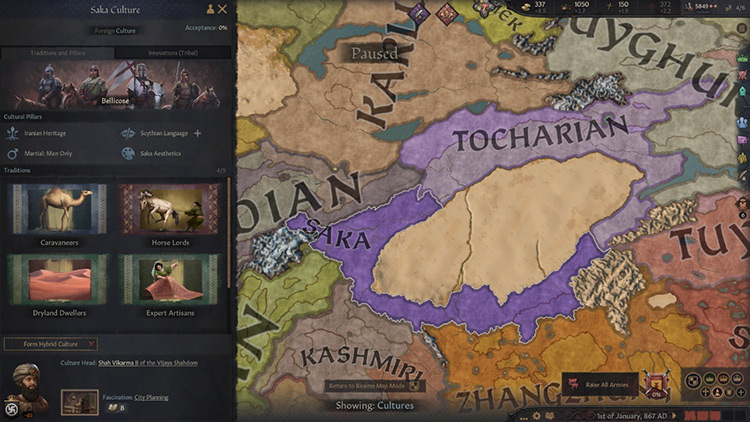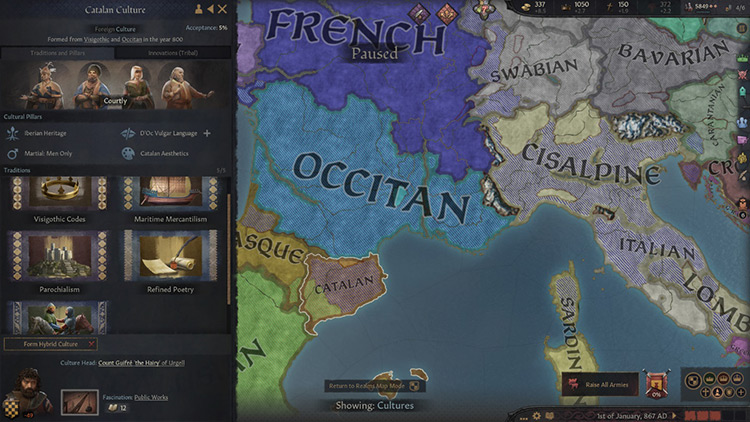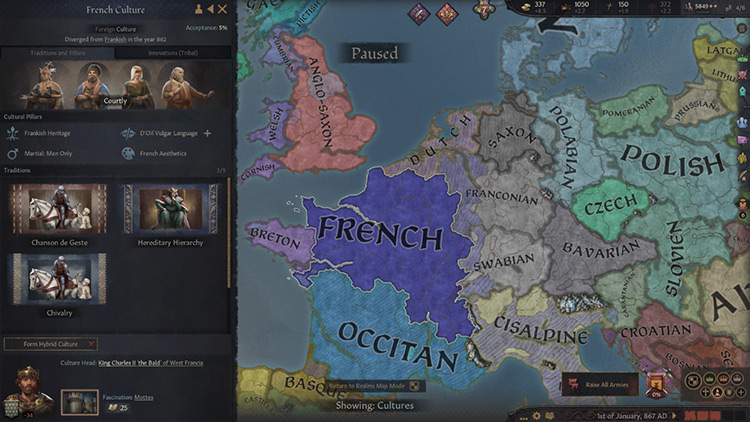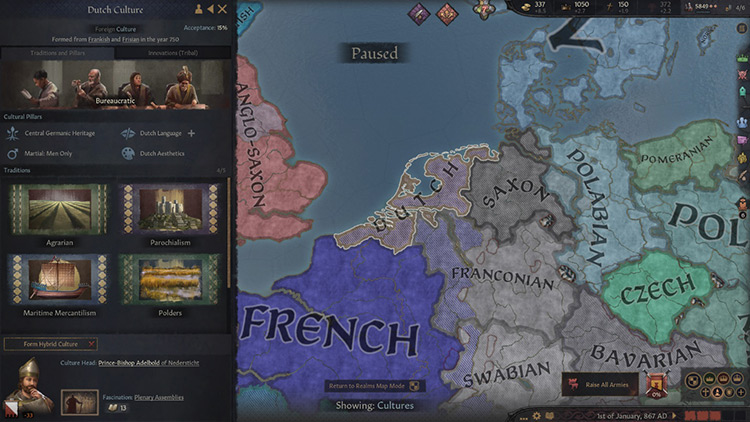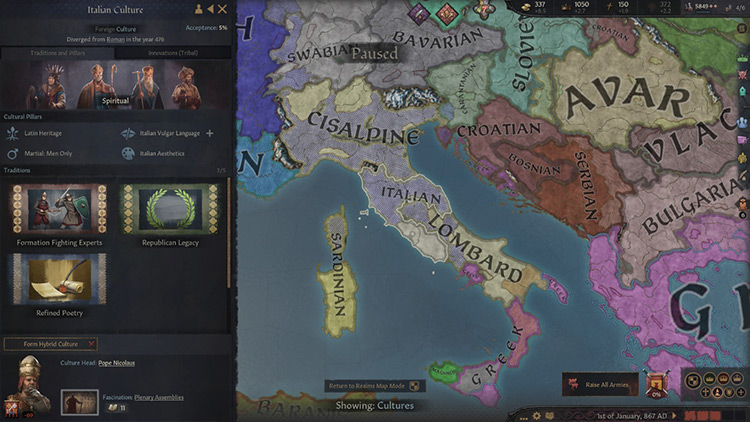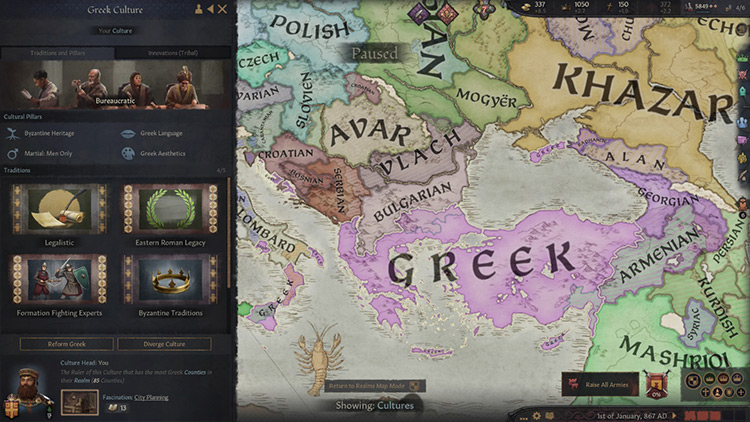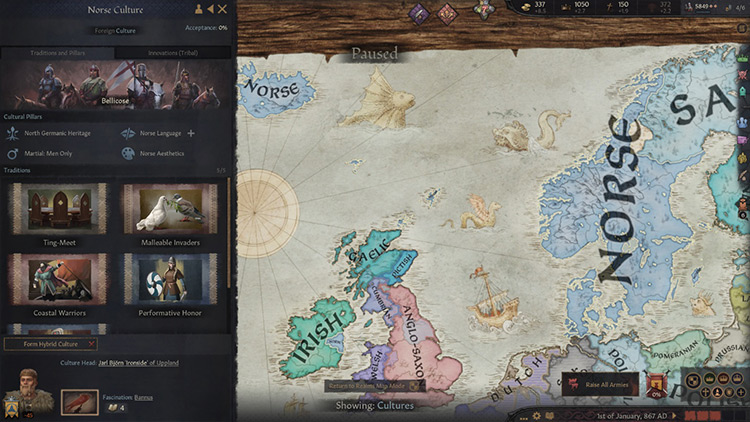However, to better represent their quirks and peculiarities in the game, the various cultures begin with traditions already attached to them. The “Cultural Heritage” and “Language” aspects govern the base amount of mutual respect between cultures; they are harder to change and rarely worth it. Cultural traditions on the other hand can be added and replaced at the cost of substantial prestige, depending on how compatible they are. The bigger the culture, the more time will be needed for the tradition to be established. Note: This ranking will be based mostly on the uniqueness of each culture, and not how strong it is when you minmax your gameplay.
7. Saka
The Saka culture makes the list largely due to its unique access to the “Horse Lords” tradition. Normally, the tradition is available only to cultures with a Mongolic or Turkic heritage. Saka has Iranian heritage and starts with the “Horse Lords” tradition. No wonder, Saka simply means Nomads in the Farsi language. I recommend reading on the Saka, as they are one of the least known cultures represented in the game. The surviving records describe them as red-haired, yellow eyed, and tall in stature. In the heart of Asia! On top of the “Horse Lords” tradition, the rest of the Saka’s starting traditions give them the tools necessary to build up a strong kingdom in the Tarim Basin. Cheaper building construction and extra bonuses on desert agriculture is godsent in this harsh and unforgiving land.
6. Catalan
The Catalan culture received lots of flavor in the Iberian DLC, as did all the other Iberian cultures. “Parochialism” and ‘Maritime Mercantilism” encourage building up cities that will make you rich. The “Refined Poetry” and “Ritualized Friendship” offer some nice flavor in events. All Iberian cultures start with the “Ritualized Friendship” which allows you to become best friends with one other character. This provides a strong hook on them, and they get one on you. Using this hook will give you stress, but it can be invaluable. Securing a good marriage or help in a war, for example. Finally, along with the Basque and the Aragonese, the Catalans have access to the “Visigothic Codes” tradition. This simply allows access to the “Equal” and “High Partition” succession laws. Enacting High Partition in the 9th century is huge and saves you the hassle of dealing with confederate partition!
5. French
The French culture begins with only three traditions, all of which are very impactful. First and foremost, the “Chanson de Geste” tradition is essentially a combination of “Poetry” and “Martial Admiration”. On top that, it allows for the cultural innovations of “Valets” to be discovered in the Late Medieval Era. This innovation gives access to the powerful “Gendarme” heavy cavalry. Then you have “Chivalry”. This gives a buff to your heavy cavalry, while making characters of the culture to constantly attempt romance schemes. This can be funny at first but can get annoying very fast. You also get unique options to spar against your knights, essentially doing training sessions. The “Hereditary Hierarchy” is the least interesting one. It makes your feudal vassals give you more money and build cheaper castles. Your long-lived characters will enjoy huge buffs to general opinion. The French culture embodies the stereotypical medieval knightly culture many of us associate with the Middle Ages. You are encouraged to rule without any tyranny, while enjoying an entourage of gallant knights!
4. Dutch
If you want to play a tall campaign where you develop and improve your small realm, then Dutch is the culture you are looking for. They are all about developing and making money! The unique tradition “Polders” gives great bonuses to many buildings in coastal holdings. It also allows the innovation “Adaptive Militia” in the Late Medieval Era, which gives access to the Goedendag Militia. This units counter heavy cavalry. Perfect to keep those pesky French out of your lands! The rest of the traditions compliment a tall playstyle, with a focus on coastal provinces. You’re encouraged to build cities for the most part. The bonus from “Maritime Mercantilism” offsets the “Parochialism” malus to republican vassals.
3. Italian
Italian culture gets its high spot on the list due to the “Republican Legacy” tradition. The “Formation Fighting Experts” tradition is a strictly martial one. It encourages the use of archers and spears instead of light cavalry and skirmishers. Your men-at-arms will be more efficient at the cost of dealing less damage during the pursuit phase after a winning battle. The “Refined Poetry” simply makes the “Poet” trait a bit more potent and common. Not much to say about it. This leaves “Republican Legacy”. This is essentially “Parochialism” on steroids. It allows easier appointment of republican vassals via a unique interaction with your counts. It increases the value of city holdings and makes it cheaper to build in them. Moreover, count-level and above republican vassals will give you more taxes and levies. Oh, and you can unlock the “Pike columns” innovation in the High Medieval Era, giving access to the powerful Picchieri spearmen. However, all of this comes at the cost of a reduced opinion with republican vassals and a control penalty from each city holding!
2. Greek
For a culture with no dedicated update yet, Greek has a lot of unique flavor already. The “legalistic” tradition encourages a just playstyle, giving you penalties if you rule through dread and tyranny. It makes title creation significantly cheaper, while it also raises your vassal limit by a great amount. Perfect for managing a vast empire! The “Eastern Roman Legacy” tradition allows the recruitment of Cataphracts, a unique type of heavy cavalry. It reduces the cost of maintaining men-at-arms, while also reducing your available levies. Essentially, it encourages you to keep a professional standing army instead of relying on levies. The bonuses from this are complimented by the “Formation Fighting Experts” tradition. You want a standing army of spears, archers, and heavy cavalry. Mix in some heavy infantry and of course knights and you are set to restore the legacy of Rome. Lastly, the “Byzantine Traditions” allow blinding and castration of prisoners. It gives some bonuses to Eunuchs and allows for the “Chief Eunuch” court position. It also prevents disfigured and infertile characters to press their claims against Greek characters. Greek characters get access to unique succession mechanics and a big bonus to their hostile scheming, while having a huge penalty to opinion during the first years of a new ruler’s ascension. This perfectly captures the intrigue and succession crises that dominated the Byzantine court.
1. Norse
The Norse were the subjects of the first major flavor pack in the game, thus they enjoy a lot of flavor. Much of that flavor comes through their unique culture and its traditions. Boy where to even begin… They start with the “Longships” innovation, which allows them to raid overseas. They also embark and disembark a lot faster. The “Performative Honor” tradition allows you to challenge criminals in single combat. It also allows the appointment of Shieldmaidens; now you can put those high-prowess sisters of yours to good use! The delicate, weak, and craven traits provide maluses to characters. The “Ting-Meet” gives access to the unique “Scandinavian Elective” succession law. Being Brave, Gregarious, Generous, or a Blademaster increases your popular opinion. Because Scandinavian Elective takes popular opinion into account, these indirectly translate to a higher chance of election! The “Northern Stories” gives bonuses to the Poet trait, makes characters of this culture better educators, and allows rulers to raise runestones. Runestones cost money, can be raised every five years to commemorate an event, and provide some nice bonuses to the selected county as well as piety and prestige. The “Coastal Warriors” tradition makes the “Strong” trait more common, while its associated traits provide prestige. You can also recruit four unique men-at-arms units, all of them infantry. Other cultures barely get one! And lastly, the “Malleable Invaders” tradition allows cheaper conversion to another faith and the option to embrace the local realm’s traditions, converting you and your vassals to the local faith and culture. On top of that, making hybrid cultures is easier. Even if you do not like something about the Norse, making use of their easier hybridization you can handily create a new culture anywhere in the world. This way you can tailor it to better suit your needs!
